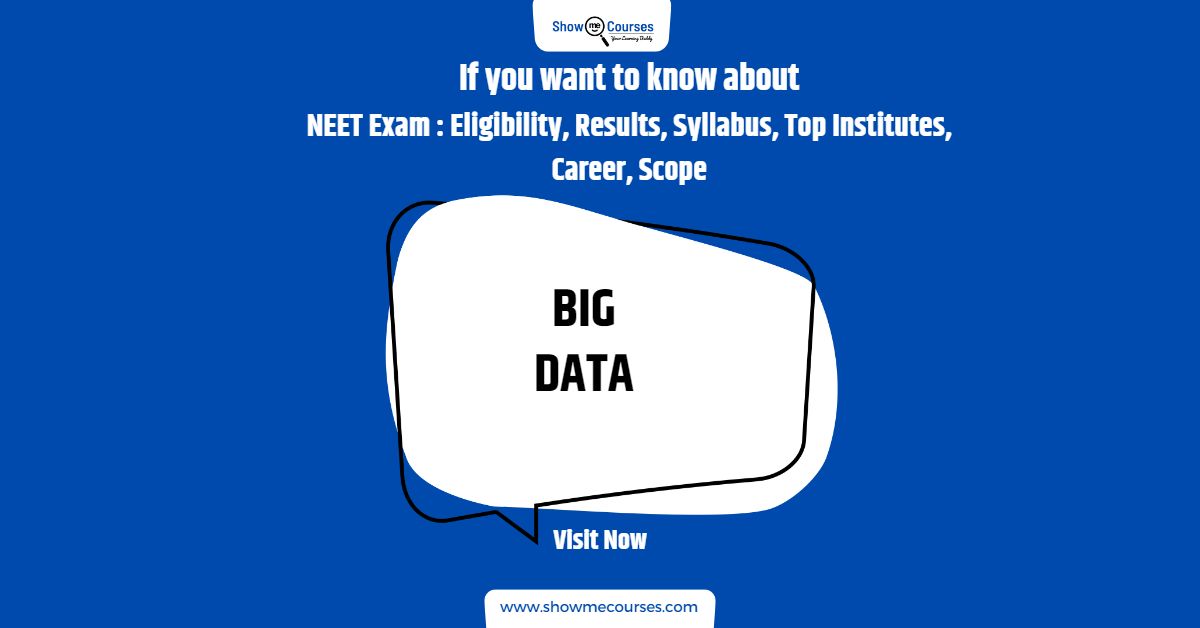BIG DATA

Table of Contents
ToggleBIG DATA
“Big data” refers to the large, complex datasets that are created by businesses and organizations in today’s digital world. These datasets are frequently too large and complex to be managed and analyzed using traditional data processing tools and techniques.
It is typically characterized by its volume, variety, velocity, and veracity. Volume refers to the sheer quantity of data generated, which can be in the petabytes or even exabytes. Variety refers to the wide range of data types, including structured, unstructured, and semi-structured data. Velocity refers to the speed at which data is twisted and needs to be processed. And veracity refers to the doubt and inconsistencies in the data.
To be able to effectively analyze, organizations need to use specialized tools and technologies, such as distributed systems, parallel processing, and cloud computing. These tools allow for the efficient processing and analysis of big data and can help organizations uncover valuable insights and make more informed decisions.
Overall, It is a fast-growing field that is transforming the way businesses and organizations function and make decisions. By leveraging the power of big data, organizations can gain an advantage and improve their performance in today’s data-driven world.
BIG DATA Highlights
| Course Name | Data Science |
| Eligibility | 50% in PCM with CS/IT/Statistics/Economics as optional courses in classes 10 and 12 or 50% |
| Top Courses | BTech Big Data Analytics BCA Data Science BSc Data Science MSc Data Science Diploma in Data Science |
| Salary | INR 5 – 5.7 lakh annually |
| Certifications | Microsoft Data Science Certification IBM Data Science Professional Certificate Google Date Science Certification |
Why Choose BIG DATA

There are some reasons why organizations might select to use big data technologies:
- Improved decision making: By analyzing large volumes of data, organizations can gain insights and make more knowledgeable decisions.
- Increased efficiency: Big data can help organizations classify patterns and leanings that can help streamline developments and improve effectiveness.
- Competitive advantage: By leveraging big data, organizations can gain a good advantage by uncovering new chances and insights that may not be immediately apparent to their competitors.
- Personalization: Big data can help organizations create more modified experiences for their customers, which can lead to increased customer satisfaction and loyalty.
- Cost savings: By identifying inefficiencies and streamlining processes, organizations can potentially reduce costs and increase profitability.
- Risk management: Big data can help organizations identify and mitigate potential risks by providing a more complete picture of their operations.
BIG DATA Eligibility
There are no explicit educational or professional requirements for working with big data. However, persons who have a strong foundation in math, statistics, and computer science may be better suited for roles that involve analyzing and understanding large datasets. Some specific skills that may be helpful for working with include:
- Programming languages such as Python, Java, or C++
- Data analysis and visualization tools such as Excel, Tableau, or R
- SQL (Structured Query Language) for querying databases
- Machine learning and artificial intelligence algorithms
- Statistics and statistical analysis
- Strong problem-solving and critical thinking skills
In addition to technical skills, individuals who work with should also have strong communication and collaboration skills, as they may need to work with cross-functional teams and present findings to non-technical stakeholders.
BIG DATA Admission Process

The admission process for a big data program will vary depending on the specific institute and program. Generally, however, the following steps are common:
- Research and choose a program: Look for programs that propose the specific coursework and training that align with your career goals. Consider factors such as the program’s standing, faculty, curriculum, and job placement rate.
- Meet the admission requirements: Most programs have specific requirements for admission, such as a bachelor’s degree in a connected field and a minimum GPA. Some programs may also need candidates to take the GRE or GMAT.
- Submit an application: Most programs will need you to submit an application, which may contain transcripts, letters of recommendation, a resume, and a personal statement.
- Interview: Some programs may need an interview as part of the admission process. This may be an in-person or practical interview with a program typical or faculty member.
- Receive an acceptance letter: If you are accepted into the program, you will accept a letter outlining the next steps for enrolling in the program.
- Enroll: Once you have been accepted into the program, you will need to complete any necessary enrollment paperwork and pay any required fees.
It’s important to carefully research and compare different big data programs to find the one that best meets your needs and career goals.
BIG DATA Entrance Examinations
Some big data programs may need candidates to take entrance exams as part of the admission process. These exams may include:
- GRE (Graduate Record Examination): The GRE is an identical test that is often compulsory for admission to graduate programs in the fields of business, engineering, and computer science. It measures verbal intellectual, quantitative reasoning, and analytical writing skills.
- GMAT (Graduate Management Admission Test): The GMAT is an identical test that is frequently compulsory for admission to MBA programs and other business-related graduate programs. It measures verbal, quantitative, and analytical writing skills.
- TOEFL (Test of English as a Foreign Language): The TOEFL is an identical test that measures English language skill for non-native English speakers. It may be required for admission to big data programs for international students.
- IELTS (International English Language Testing System): The IELTS is an identical test that measures English language proficiency for non-native English speakers. It may be compulsory for admission to big data programs for international students.
It’s important to check with the specific program you are applying to to see if they have any entrance exam requirements. Some programs may also accept alternative exams or waive the exam requirement if you have a strong academic record or professional experience.
BIG DATA Syllabus

A syllabus for a course on big data might contain the following topics:
- Introduction to big data: Meaning of big data and its characteristics (volume, velocity, variety, veracity).
- Data storage and processing: Overview of data storage skills (e.g., Hadoop, Spark) and data processing frameworks (e.g., MapReduce, streaming).
- Data visualization: Techniques for imagining and communicating large and complex datasets (e.g., charts, graphs, dashboards).
- Data analysis and machine learning: Introduction to data analysis techniques (e.g., statistical analysis, regression) and machine learning algorithms (e.g., decision trees, neural networks).
- Data ethics and privacy: Discussion of ethical issues related to big data (e.g., privacy, bias) and strategies for addressing them.
- Case studies: Analysis of real-world examples of big data applications in various industries (e.g., healthcare, finance, marketing).
Other potential topics that might be included in a big data syllabus include data governance, data lakes, cloud computing, and data engineering.
BIG DATA Top Colleges
- D.Y. Patil College of Engineering, Akurdi
- Christ University
- Amity University, Noida
- Adani Institute of Digital Technology Management
- Presidency College
- Jain Deemed-to-be University, Bangalore
- Amity University, Gurugram
- Mody University of Science and Technology
- Kristu Jayanti College
- St. Xavier’s College, Ahmedabad
BIG DATA Distance Education
Distance education, also known as online education, is a type of education that permits students to complete coursework greatly, often through the use of the internet. Many institutes offer programs in big data that can be finished entirely online, or that have a mixture of online and on-campus components.
Advantages of distance education in big data include:
- Flexibility: Distance education programs often permit students to complete coursework on their own schedule, making them a good choice for students who have other commitments or who are placed far from a campus.
- Cost: Distance education programs may be less expensive than on-campus programs, as they frequently do not require students to pay for housing or other on-campus expenses.
- Convenience: Distance education programs can be retrieved from anywhere with an internet connection, making them suitable for students who live far from a campus or who have busy schedules.
However, it’s important to keep in mind that distance education programs may need a high level of self-motivation and discipline, as students are accountable for managing their own time and finishing coursework on their own. It’s also important to research the reputation and accreditation of any distance education program you are considering.
BIG DATA Jobs
Big data is a fast-growing field with a wide range of career chances. Some common job titles in the field of big data include:
- Data scientist: Data scientists use statistical and machine learning methods to analyze large datasets and extract insights. They may work in a variation of industries, including finance, healthcare, and retail.
- Data engineer: Data engineers design, build, and maintain the systems that are used to store, process, and analyze large datasets. They may work with technologies such as Hadoop and Spark.
- Data analyst: Data analysts use statistical and logical techniques to extract insights from data and connect them to stakeholders. They may work in industries such as marketing, finance, and healthcare.
- Data visualization specialist: Data visualization specialists create imaginings of large datasets to help connect insights and findings to stakeholders. They may use tools such as Tableau and Power BI.
- Machine learning engineer: Machine learning engineers design and build machine learning models that can analyze and understand large datasets. They may work in industries such as finance, healthcare, and e-commerce.
Other possible job titles in the field of big data include data architect, data consultant, and data management specialist. The specific job duties and responsibilities for these roles may vary depending on the industry and organization.
What After BIG DATA
There are many career paths you can follow after finishing a program in big data, depending on your interests and goals. Some potential choices include:
- Pursue advanced education: You may select to continue your education by following a master’s or doctoral degree in a related field, such as data science, machine learning, or computer science.
- Enter the workforce: You can use the skills and information you increased in your big data program to pursue a career in a variety of industries, including finance, healthcare, retail, and marketing.
- Start your own business: You may select to use your knowhow in big data to start your own business, offering consulting or data analysis services to organizations.
- Continue learning and developing your skills: As the field of big data is continually evolving, it’s important to stay up-to-date on new technologies and techniques. You can do this through continuing education courses, professional development workshops, and networking with other professionals in the field.
Ultimately, the path you select after finishing a program in big data will depend on your personal interests, goals, and circumstances. It’s important to carefully consider your choices and select the path that best aligns with your strengths and career aspirations


